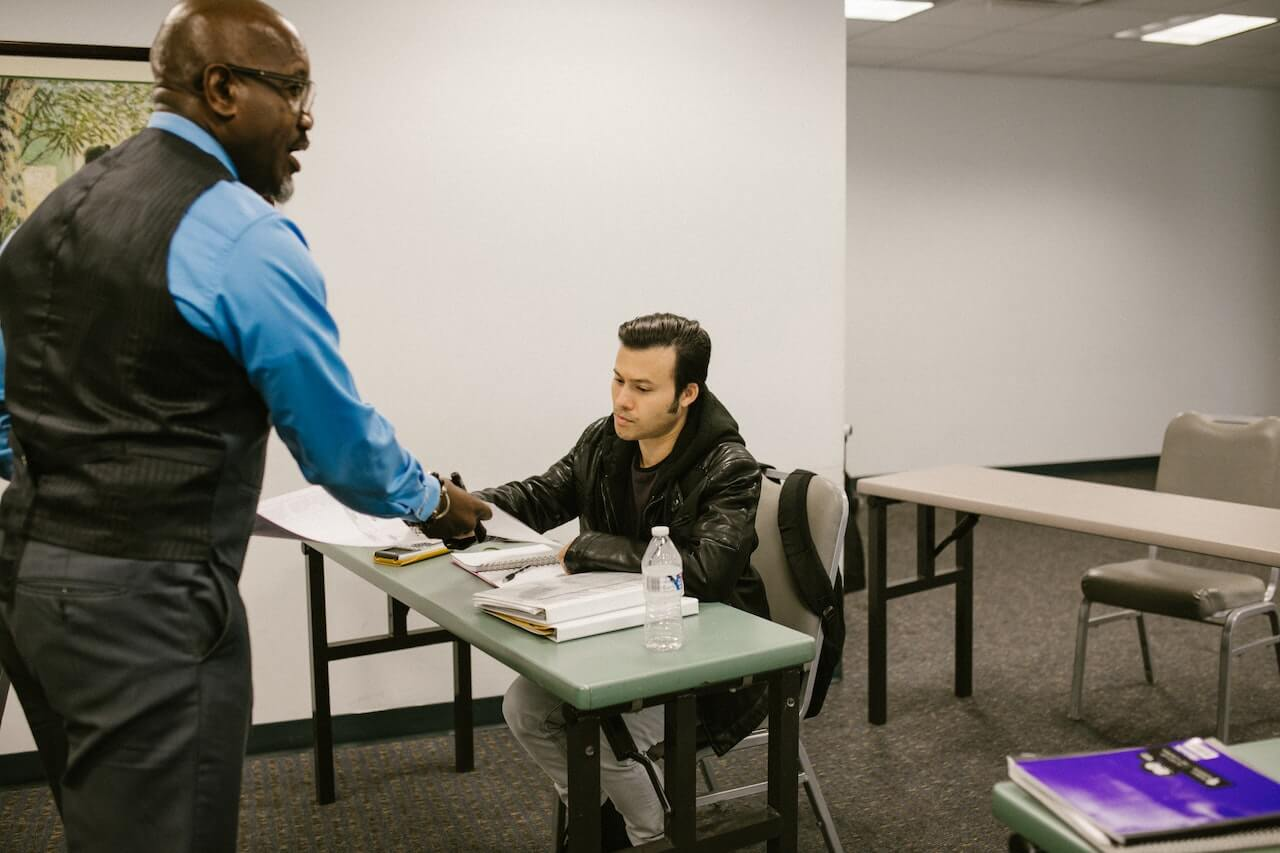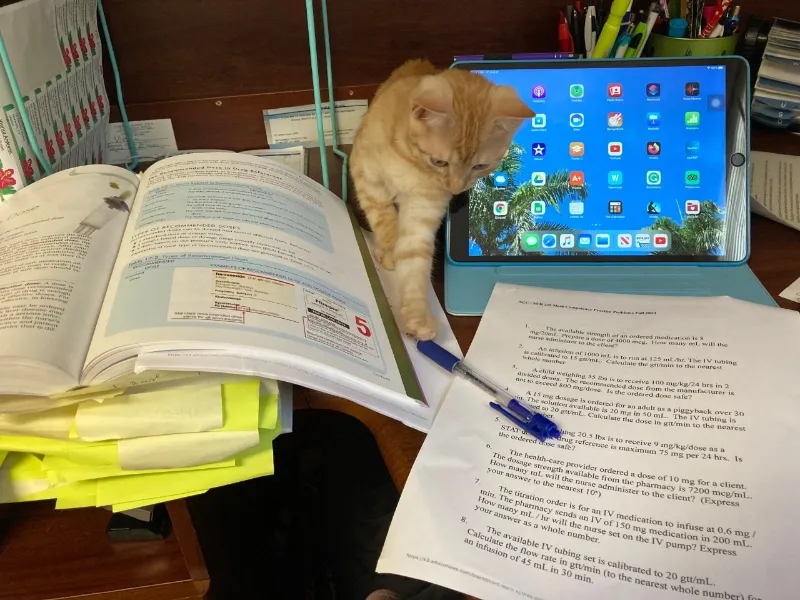What Happens if You Fail a Class in College?


If you're reading this, you might be dealing with the stress of failing a college class, or you're just curious about what could happen if things don't go smoothly. Sometimes, despite our best efforts, things don't go as planned, and that's okay. The important thing is to stay informed and prepared for whatever comes our way.
Let's be real, failing a college class is not fun, and it can have some not-so-great consequences. But hey, it's not the end of the world either! In this Bold article, we'll explore the potential repercussions of failing a college class and share some practical tips on how to recover from it and avoid similar situations in the future. So, let's get started and make sure you're well-prepared if this ever happens to you!
Visit our Scholarship Blog to find out how many classes to take in a semester without overwhelming yourself. And apply for scholarships today!
Get Matched to Thousands of Scholarships
Create your Bold.org profile to access thousands of exclusive scholarships, available only on Bold.org.
Create Free ProfileCollege Grading Systems
Before diving into what happens when you fail a class, it's important to take a look at how most college classes and grading systems work. Colleges commonly use a 4.0 scale, where A is 4.0, B is 3.0, C is 2.0, D is 1.0, and F is 0. Additionally, some schools follow a pass/fail or satisfactory/unsatisfactory grading system. In these cases, failing a class would mean not reaching the minimum competency required for pass or satisfactory grades.
When it comes to college grading systems, it's important to remember that the impact of failing grades on any successful student often goes beyond just numbers on a transcript. Failing a course can have a profound effect on your overall academic experience and future opportunities.
Check out tips on how to get good grades in college!

How Colleges Handle Failing Grades
Different colleges have varying policies for handling failing grades. In many instances when taking a college course, a failing grade will remain on your academic transcript, influencing your cumulative GPA. The GPA, or Grade Point Average, is a numerical representation of your academic performance. It is used by colleges and universities to assess your academic standing and determine your eligibility for various programs, scholarships, and honors.
When you receive an F or fail grade, it means that you did not meet the minimum requirements for passing the course. In most grading systems, an F carries no points towards your GPA. This means that if you fail a class, your GPA will take a hit, potentially dropping significantly depending on the number of credits the failed class carries.
Not only can a failed grade lower your GPA, but it can also have other repercussions. Many colleges have academic probation policies, which are triggered when a student's GPA falls below a certain threshold. Academic probation typically comes with restrictions and requirements that you must meet in order to continue your enrollment at the institution. These may include meeting with an academic advisor, attending study skills workshops, or limiting the number of classes you can take in a semester.
Create Your Free Profile to Apply for Scholarships Today!
Furthermore for many college students, a failed grade can have implications beyond your GPA and academic standing. Many scholarships and financial aid programs require students to maintain a certain GPA in order to remain eligible. If you fail a class and your GPA drops below the required threshold, you may lose your financial aid or scholarship, making it more challenging to afford your education.
Create free a Bold.org profile today to access hundreds of scholarships!
Each college or university has its own policies and procedures for handling failing grades. Some institutions offer options like grade forgiveness or grade replacement. Grade forgiveness allows students to retake a failed class and have the new grade replace the original, failing class grade in their GPA calculation. This can help mitigate the impact of a failing grade on your overall GPA. However, not all colleges offer this option, and there may be limitations on the number of classes that can be forgiven.
Universities may also provide options like grade appeals or withdrawal procedures to limit the affects a failed class can have on future courses and your academic record, but these options often come with stringent conditions and timelines. Grade appeals allow students to contest a grade they believe was given unfairly or in error. Withdrawal procedures allow students to drop a class after the designated add/drop period, typically without any academic penalty.

Outcomes and Consequences of Failing a Class
Failing a class can have many implications that are immediate or affect your future educational pursuits. If you plan on attending graduate school, it is important to remember that many programs require a certain minimum GPA for admission. They may also thoroughly examine your transcript, evaluating your performance in individual courses. A failed course can significantly impact how the admission committee perceives your candidacy, potentially raising doubts about your ability to handle the academic rigor of a graduate program which can lead to poor academic performance. It may be seen as a red flag, indicating a lack of discipline or the inability to meet the demands of higher education.
Additionally, failing a class can have psychological and emotional effects beyond immediate consequences. It can lead to feelings of disappointment, frustration, and a blow to self-confidence. These emotional repercussions can linger and affect your motivation and overall academic performance in subsequent courses. Addressing these feelings and seeking support from academic advisors, counselors, or support groups is important to help navigate the challenges and develop strategies for future success.
GPA is Affected
Under most grading systems, an F or fail grade contributes no points towards your GPA, which means it can significantly drop your overall GPA. This drop in GPA can trigger consequences such as academic probation or even dismissal from certain programs in medical school, especially if one fails multiple classes or a high-credit course.
A significant dip in your GPA could put you on academic probation. This status is a warning from the university and means that you have a specific time frame to improve your grades or face more serious penalties, like academic dismissal.
Academic probation is not just a mere bureaucratic formality; it can have a profound impact on your college experience. While on probation, you may be required to attend mandatory academic support programs or meet regularly with an academic advisor. These interventions aim to provide you with the necessary tools and guidance to get back on track.
A failing grade can negatively affect your academic standings and eligibility for financial aid and certain programs, activities, or opportunities that require a specific GPA.
Financial Aid
Many financial aid programs require students to maintain a certain GPA. If a failing grade causes your GPA to drop below the required threshold, you could potentially lose your financial aid. This could pose serious difficulties, particularly for students who heavily rely on such aid.
The loss of financial aid can have far-reaching consequences. It may force you to reevaluate your financial situation and explore alternative funding options. This could mean taking on additional part-time jobs, applying for scholarships, or even considering student loans.
Moreover, the loss of financial aid can disrupt the delicate balance between work and study. With the added pressure of financial responsibilities, you may find yourself juggling multiple jobs while trying to catch up academically. This can lead to increased stress and a potential decline in overall well-being.

Retakes
If you fail a class that's a must-have for your major, chances are you'll need to retake it. But here's the thing: each college has its own rules when it comes to retakes. Some colleges might put a cap on the number of times you can retake a course for one class. So, you'll need to be mindful of that limit and make the most of your chances.
Now, the way the retake affects your GPA can also vary. In some schools, the new grade you earn in the retaken class will replace the original failing grade. That's awesome because it can give your GPA a much-needed boost if you do better the second time around. However, in other or most schools and colleges, things might work differently. They might combine both the original failing grade and the new grade, which can have a more moderate impact on your GPA improvement.
Delayed Graduation
Another immediate consequence is the possibility of delayed graduation. This is especially true if the class you failed is a requirement for your major. Until you pass all required courses, you won't be able to graduate. This means investing more time and often more money to take additional classes.
Delayed graduation can have both practical and emotional implications. From a practical standpoint, it means extending your time in college, which can result in additional tuition fees, housing costs, and other expenses. It may also disrupt your post-graduation plans, such as entering the job market or pursuing further education.
Check out our blog on How to Graduate College Debt-Free for valuable tips to support your college journey!
Potential Dismissal
In extreme cases, failing multiple classes or failing a high-credit course can result in academic dismissal. Academic suspension or dismissal means that you are no longer allowed to continue your studies at the college or university. This can have a significant impact on your educational and career goals, as you may need to find an alternative institution or reassess your academic path.

Strategies to Recover from a Failed Class
Failing a class in college isn't the end of the world, and there are strategies you can use to recover and learn from the experience. When faced with the disappointment of failing a class, it's important to remember that setbacks are a natural part of life. With the right mindset and determination to learn from your mistakes, you can turn this setback into an opportunity for growth.
Retaking the Course
One of the most straightforward ways to recover from a failed class is to retake it. Not only will this give you another chance to grasp the material, but it also might allow you to replace the failing grade on one course on your transcript, depending on your college's policies. Retaking the course demonstrates your commitment to learning and can help you build a stronger foundation in the subject matter.
Moreover, retaking the course provides an opportunity to approach the course material again from a fresh perspective. You can review the concepts you struggled with before and seek clarification from your professors or teaching assistants. By actively engaging in class discussions and asking questions, you can gain a deeper understanding of the subject matter and improve your chances of success.
Seeking Academic Support
Most colleges offer academic support services, including tutoring and academic advising. These resources can help you pinpoint what caused you to fail and develop strategies to succeed in the next future exams. Seeking academic support is not a sign of weakness, but rather a proactive step towards improvement.
Tutors can provide personalized guidance and help you navigate through challenging concepts. They can offer alternative explanations, additional practice problems, and study tips tailored to your learning style. Academic advisors can help you create a plan to get back on track academically. They can assist you in selecting the right courses, managing your time effectively, and setting realistic goals.
Improving Study Habits
Failing a class can be an opportunity to self-reflect and improve your study habits. Experiment with various study techniques, and find what works best for you. Whether it’s group study, flashcards, or regular revisions, a good study habit can make a significant difference.
Consider creating a study schedule that allows for regular review sessions and breaks to avoid burnout. Breaking down the material into smaller, manageable chunks can make it easier to digest and retain. Finding a quiet and comfortable study environment can help you stay focused and minimize distractions.
It's also worth exploring different resources and tools that can aid in your learning process. Online educational platforms, such as interactive tutorials or educational videos, can provide supplementary materials to enhance your understanding of the particular subject or matter. Utilizing technology can help you reinforce your knowledge and make studying more engaging.
Remember, recovering from a failed class takes time and effort. It's important to remain persistent and stay motivated throughout the process. Implementing these strategies and seeking support when needed can turn this setback into a stepping stone toward future classes of success.

How to Avoid Failing a Class in College
To avoid failing a college class, you can find strategies that work best for you. Some strategies include proper time management, creating a study schedule, breaking tasks into manageable parts, and eliminating distractions. Prioritizing important assignments and projects is also crucial for effective time management. Most importantly, don't be afraid to ask for help!
Talk to Your Professor ASAP
Make an effort to establish a rapport with your professors. Attend their office hours or schedule a meeting to discuss any challenges you are facing or topics you are struggling to understand. They can offer additional resources, recommend study materials, or provide tips for success in their specific courses. Your professor could also work out a plan to improve your grade in the course.
Meet with Your Academic Advisor
Your academic advisor is another valuable resource. They can help you navigate your various degree program and requirements, choose appropriate courses, and explore academic opportunities. Regularly meeting with your advisor can ensure that you are on track to meet your academic goals and can provide guidance on any necessary adjustments to your course load or schedule.
Check Your College Policies
Each college's policies are different, so make sure you explore these options and understand the consequences before making any decisions. It's helpful to familiarize yourself with your school's policies, including pass/fail classes and the option to drop a class. If you find yourself at risk of failing and unable to raise your grade, switching to pass/fail grading might be a viable option to protect your GPA. Alternatively, dropping the class altogether could be a suitable decision.
While failing a class in college can have both immediate and long-term impacts, remember that it's not the end of your academic journey. Many students have been in your shoes and successfully navigated their way out. The key is to embrace the situation as a learning opportunity, one that can strengthen your academic skills, resilience, and determination to succeed.

Frequently Asked Questions About Failing a College Class
Is it better to drop a class or fail?
It depends on your situation and college policies. Dropping avoids a failing grade but may have credit and financial implications. Failing affects GPA but offers credit and potential grade replacement options. Talk to your advisor for personalized advice.
Will failing a class affect my financial aid?
Failing a class can affect financial aid. Many programs require maintaining a minimum GPA, and if it drops, aid may be at risk. Check your community college here's policies and speak to a financial aid advisor for guidance.
How many classes can I fail in college before I get kicked out?
Colleges have different policies on the number of failed classes before dismissal. Some schools enforce strict rules on class attendance and put students on academic probation if they fail a certain number of classes. If students fail to show progress during academic probation, they may face dismissal.
For more information about college classes, credit hours, academic probation, and financial aid, visit the Bold Scholarship Blog!